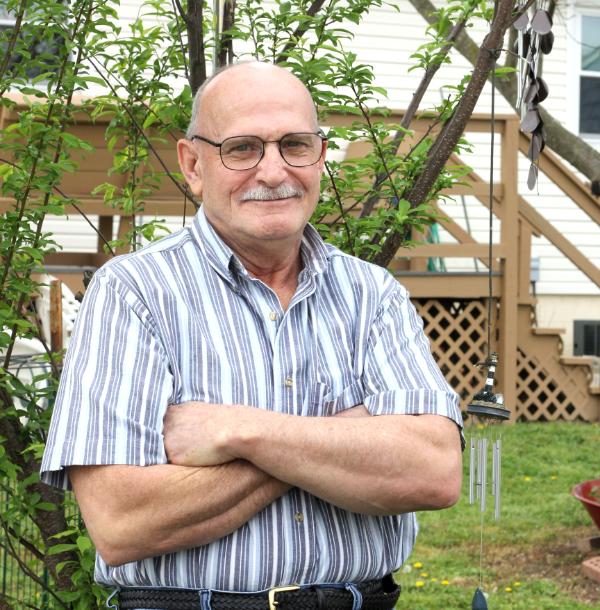Latest News
Clinical
Veteran survives two wars and advanced stage esophageal cancer
May 23, 2013

Hopewell military veteran Alan Daugherty survived Desert Storm and Vietnam, but little did he know that he was also battling another war: cancer.
In August 2012, he was told that he had advanced stage esophageal cancer. “I was taken by surprise, I had no symptoms, no warning,” he explained.
Esophageal cancer is one of the rarest forms of cancer, yet the incidence rate has doubled in the last decade. This form of cancer develops in the esophagus, the muscular tube that connects the throat to the stomach and allows food to enter the stomach for digestion.
Daugherty began chemotherapy and radiation treatments in September, and by October, his cancer had been lowered to stage two. His oncologist recommended that he visit thoracic surgeon Rachit Shah, M.D., at VCU Massey Cancer Center to discuss a new surgery known as minimally invasive esophagectomy in hopes of a cure.
An esophagectomy is a surgical procedure that removes all or part of the esophagus. A traditional, or open, esophagectomy has a high mortality rate, while a minimally invasive esophagectomy (when performed at a high volume center) has a better survival rate as well as other advantages in appearance, recovery and side effects. Shah is the only physician in Richmond to offer minimally invasive esophagectomy.
“I was nervous going into the consultation; it sounded like a major surgery. But Dr. Shah drew a clear picture for me and made me feel very comfortable,” said Daugherty. “We also share the same birthday, which I thought was a good sign,” he added with a laugh.
Shah explained to Daugherty that the procedure begins with small band-aid-type incisions (0.5 to 1 cm long) in the abdomen, chest and, occasionally, the neck, based on the location of the tumor. During the surgery, the esophagus and surrounding lymph nodes are removed, and a new feeding tube is created from the top portion of the stomach.
“Though the operation is done with the same principles of the traditional esophagectomy, the incisions are smaller, recovery is shorter and there is less post-operative discomfort,” said Shah.
Recovery following the surgery includes an average hospital stay of seven days, compared to the 10 to 14 days with traditional surgery. Patients are encouraged to participate in light activity, such as walking, once they are home, and heavy activity can typically resume around four to six weeks. Patients leave the hospital on a liquid diet provided by a small temporary feeding tube. The feeding tube helps with the healing process and provides proper nutrition. A normal diet can typically resume in three to four weeks.
Daugherty underwent surgery on December 17 and, remarkably, was walking the very next day. Just seven days later, he was sent home. But the best news came on January 4, when he was declared cancer free.
“People couldn’t believe it,” he said. ”A day after my surgery I was able to walk on my own, and after only a week, I was home.” He credits his speedy recovery to Shah’s surgical skills and to his own military background for making him tough.
“Alan’s recovery is typical of patients who undergo this surgery, but his tenacity is extraordinary,” said Shah.
Today, Daugherty is living cancer free with his wife and spending time with his grandchildren. He is grateful to be getting back into his usual routine. “I am able to walk a few miles a day and I am enjoying my video games and books again,” he said.
Written by: Alaina Schneider
Related News
Research, Clinical
How I found my research: Fosua Adu-Gyamfi learns from undergrad experiences at both Massey and the National Cancer InstituteMar 27, 2025

Get access to new, innovative care
Treatments in clinical trials may be more effective or have fewer side effects than the treatments that are currently available. With more than 200 studies for multiple types of cancers and cancer prevention, Massey supports a wide array of clinical trials.

Find a provider
Massey supports hundreds of top cancer specialists serving the needs of our patients. Massey’s medical team provides a wealth of expertise in cancer diagnosis, treatment, prevention and symptom management.
